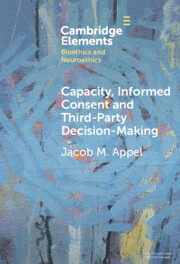Element contents
Capacity, Informed Consent and Third-Party Decision-Making
Published online by Cambridge University Press: 03 June 2024
Summary
- Type
- Element
- Information
- Online ISBN: 9781009570060Publisher: Cambridge University PressPrint publication: 31 July 2024



